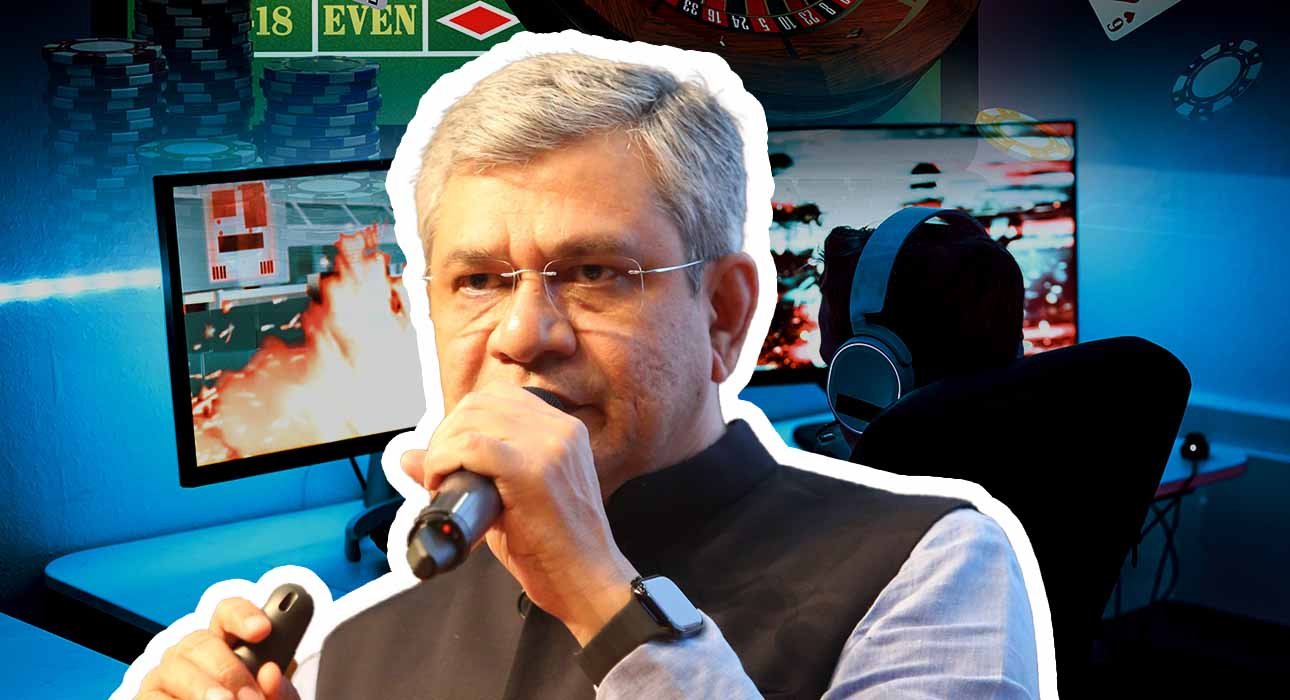On August 21, 2025, Union Electronics & IT Minister Ashwini Vaishnaw spoke to Moneycontrol, pinpointing celebrity and influencer sponsorships as leading factors luring minors and young adults to addictive online money-gaming. The minister underscored that public ignorance about the risks had increased the urgency behind the new bill’s ban on such promotion.
Mr. Vaishnaw’s remarks followed the Rajya Sabha’s approval of the Promotion and Regulation of Online Gaming Bill, 2025. Once enacted, the law will prohibit all online money-gaming, also zeroing in on advertisements and financial transactions, unveiling India’s first comprehensive national framework addressing such platforms.
Read More: Government Proposes Self-Regulation for Online Gaming Companies
The initiative comes in response to mounting alarms over the mental and financial damage real-money gaming poses to younger demographics, while the legislation promises uniform application of the rules across all states.
“Doctors and mental health practitioners/experts have said that the fundamental way in which youngsters get addicted to such games is through endorsement of celebrities and influencers,” Vaishnaw told Moneycontrol. “This is the way they get addicted to this, and it keeps on getting reinforced.”
Speaking with ANI, Vaishnaw mentioned, “Our purpose of this bill and this exercise has been ongoing for almost three plus years, where we have deeply engaged with industry to see how the harmful impact can be prevented, contained and reduced.”
The recently introduced Online Gaming Bill aims to establish India’s first nationwide legal framework governing digital gaming. With the sector evolving at a terrific pace, the legislation is intended to disaggregate e-sports and social games from high-risk, stake-based activities. A sweeping provision at the Bill’s centre point forbids any internet-based game in which fees, deposits, or other stakes are exchanged for the expectation of cash, regardless of the underlying mechanics of luck or skill.
Overall, the statute attempts to prevent a betting-like environment by prohibiting three interlinked activities: offering online money games, marketing or endorsing such products, and processing monetary movements that underpin such stakes. Correspondingly, banks, wallets, and other payment aggregators will be left with no scope to clear or settle transactions associated with the prohibited games.
Read More: Limiting the gaming addiction among Children
To enforce compliance, the proposed legislation prescribes severe sanctions. Managers of unlicensed money gaming platforms risk three years of rigorous imprisonment and/or monetary penalties of up to Rs 1 crore. Anyone advertising such platforms may be imprisoned for up to two years and/or fined Rs 50 lakh. Financial entities processing related transactions can incur the same three-year term of imprisonment and/or Rs 1 crore fine. Repeat offenders will incur steeper penalties, involving extended prison terms and elevated fines, according to ANI.
Identified offences are cognizable and not bailable. Empowered officers may search, seize, and arrest in suspected offences without prior warrants. The law is expressly designed to avoid criminalising the players themselves; rather, it classifies players as victims of compulsive gaming. Criminal sanctions are directed exclusively at operators, promoters, advertisers, and financial facilitators.
The new prohibition on celebrity endorsements signals a cultural recalibration, curbing the glamorization of platforms linked to long-term behavioural harm. Policymaking now considers the insights of mental health practitioners, who frame the issue as collective, rather than individual, responsibility. Moreover, the statute is part of a systemic state strategy to safeguard mid/low-income households and young people from addiction, debt, and the corrosive loss of opportunity.
Minister Vaishnaw insisted that the phenomenon is not merely amenable to legislation: action from families, teachers, coaches, and friends is equally indispensable. Crucially, the measure secured backing from the Indian Institute of Creative Technologies, a testament to a growing consensus that the creative economy, rather than resisting, must responsively shape behavioural norms.
Read More: Bombay High Court permits a boy with internet gaming disorder to sit for an improvement exam
On a positive note, e-sports will officially become a recognised competitive activity. The Sports Ministry will create detailed guidelines, fund training academies, introduce a structured incentive program, and provide infrastructure support. At the same time, MeitY will back social gaming projects that focus on skill development, cultural literacy, and educational improvement.
The Promotion and Regulation of Online Gaming Bill, 2025, opposes exploitative money-gaming by penalising operators and promoters. It also supports safer options like e-sports and social gaming. However, its real impact will depend on strong enforcement and society’s efforts to create a healthier gaming culture.
FAQ’S
1. What does the Promotion and Regulation of Online Gaming Bill, 2025, aim to do?
The bill seeks to ban online money-gaming in India by prohibiting advertisements, endorsements, and financial transactions that support such platforms, while creating a national regulatory framework.
2. Are all online games banned under the new law?
No. The law specifically targets money-gaming involving stakes, deposits, or fees with the expectation of cash returns. E-sports and skill-based social games are excluded and officially recognised as legitimate activities.
3. What are the penalties for violating the law?
Operators of unlicensed platforms face up to 3 years in prison and/or fines up to ₹1 crore. Advertisers may be jailed for up to 2 years or fined ₹50 lakh. Financial intermediaries processing related payments face similar 3-year terms and fines.
4. Will players also be punished under this law?
No. The law treats players as victims of compulsive gaming. Criminal liability falls only on operators, promoters, advertisers, and financial facilitators.
5. How does the bill promote safe gaming alternatives?
Alongside restrictions, the government is supporting e-sports and social gaming, with plans for training academies, structured incentives, and infrastructure to promote skill development and constructive play.
